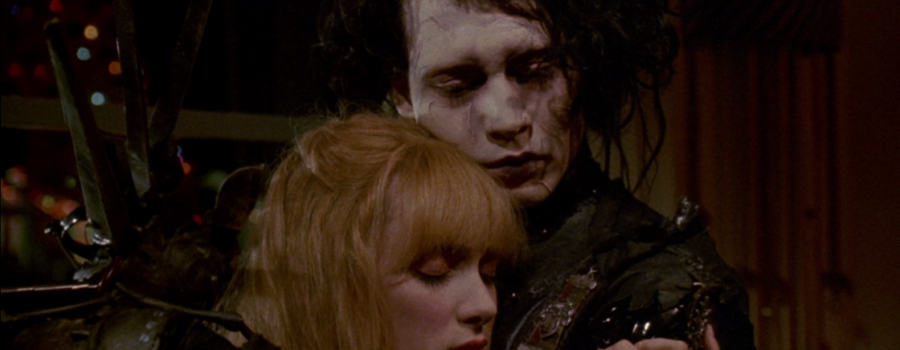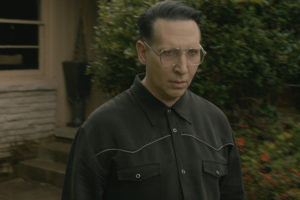Every great director has at least one masterpiece. Every auteur has a distinct style entirely unique to their own imagination. No filmmaker, however, has a mind as imaginative as that of Tim Burton’s, one so indelibly characterizable that even the most casual filmgoer immediately knows when they are watching one of his movies. Visually and stylistically, virtually all of his movies could seamlessly coexist in the same cinematic universe. Mr. Burton has several masterpieces in his filmography; “Beetlejuice”, “Ed Wood”, and “Big Fish”, along with “The Nightmare Before Christmas” as a writer and visual mastermind, all represent superior works of art that exemplify the best of a creative genius. Though, however good these films may be, Tim Burton’s greatest artistic and cinematic achievement, his magnum opus, his infernal cappolavoro remains “Edward Scissorhands”, a film that represents the artistic outsider, one that uses a socially ill-equipped, misunderstood prodigal antihero to contrast his “normal” societal counterparts, providing intelligent social commentary about suburban America and humankind’s manmade, pun intended, prejudice against anything that is considered different.
Tim Burton’s miraculous, tragic gothic fantasy is the film that got me into Cinema. It has the same effect on me today as it did when I saw it as an eleven-year-old; it is still my favorite film, by and large. I would not be writing this article today, on a site which bears the titular character’s dilapidated gothic mansion in its logo, if Tim Burton had not lived his childhood as a shut-in watching old Vincent Price films. This circular effect is what keeps Cinema alive, it is what keeps its Burton-esque cogs grinding and rotating. Being a fan of gothic horror, it is no secret that Burton is influenced by the story of Mary Shelley’s “Frankenstein”. He created the Disney-green-lighted animated short called “Frankenweenie” in 1984, a clever canine twist on the classic story of re-animation, which he remade into a feature length film some 25 years later. In between that time, Burton explored the classic story’s most prominent themes in “Edward Scissorhands”.
Not only did “Edward Scissorhands” solidify Burton’s status as a singular talent in Hollywood, but it launched the career of Johnny Depp, who, in the titular role, gives one of the most anomalous performances in the history of film. Depp portrays Edward with childlike wonder and authentic, transparent innocence. He prepared for the role with the mindset of a child, approaching everything, not solely the script alone, from a sheltered child’s perspective: curious, inquisitive, shy, and morally pure. However, as the audience finds out over the course of the film, that innocence and moral purity Edward possesses, though rare it may be, is corruptible.
The story, stripped of its artistry, might sound a bit odd on paper, because, well, it is. Edward is a man who was created by an inventor (played by Vincent Price in an endearing role) who died before he could give him hands, leaving him with only scissors, hence his last name. Edward lives in a mansion that is void of color, high up on a hill, starkly contrasting the vibrantly hued uniformity that represents Suburbia; it sticks out like a sore thumb. He is confusingly “adopted” from his home by Peg (played with taught eagerness by Dianne Wiest) and immediately submerged in modern-day society like a fish out of water. I use the word “modern-day” loosely, as the film has no succinct feel of a particular time and place. Traces of 1950s post-war suburban American society can be seen in the uniform, single-story modern home architecture, the neighbors’ matching old station-wagons, and Burton’s now signature bird’s eye shots of every car pulling out of its own driveway in unison, representing the collective automation that suburban society created. However, traces of the present day are sprinkled in the world created by Burton in the form of modern technology, the evolution of white-American gentrification in the form of strip malls and cookie-cutter, pun-intended, commercially mass-produced products, and the cloyingly nosey nature of the residents of this neighborhood that acts as a coverup for their petty, occasionally sinister grievances that they have developed as a result of decades of living in a suburban bubble, where the worst effects of capitalism have shown their nasty heads, subtly protruding throughout the film until exposing its full form in the film’s climax.
Burton uses this juxtaposition of time periods and the opposing natures of Edward to that of the collective community as a way of creating this exaggerated, suburban fantasy and highlighting socio-political issues of classism and institutional segregation; essentially, the members of the community represent the morally corrupted, living in excess without a care for anything outside of themselves or keeping up with Jack and Nancy down the street. On the contrary, Edward represents the innocent, childlike figure, unexposed to the neighborhood’s excesses and the negative consequences that accompany them. Edward, with his black, futuristic clothes, razor-sharp scissors for hands, pale skin, and contrastingly dark and disarrayed hair, is not the real monster, the members of his surrounding community are. They embraced Edward, while simultaneously trashing him amongst each other. One resident, Esmeralda, immediately deemed him Satin himself, and judged him while spewing hate and slurring profanities at anyone who associated with him. This is the first wave of prejudice Edward faces, and the first of many comically ironic scenarios. A considerable portion of the neighborhood became infatuated by him because he was different, embracing his natural aptitude for extravagant gardening and his peculiar eye for hairstyling, while others hated him for that same reason. Either way, eventually, everyone grew bored of him, just as they did with any passing fad or sensation in order to pass the time during their boring, monotonous lives. They chewed him up, tried to make him like them, corrupted him, and spit him out, eventually all sharing the same sentiment as Esmeralda originally did. And, like that, they moved on with their lives, shifting back into autopilot mode.
Edward’s “adoptive” family is played to perfection by the aforementioned Dianne Wiest as the mother, Alan Arkin (played with dry wit and an infectiously hilarious aloofness) as the patriarch, Robert Oliveri as their son Kevin, and Winona Ryder (in an unforgettable, star-making role) as the incandescent, eternally beautiful daughter, Kim, and love interest of Depp’s Edward. The film begins with narration by a much older Kim in the form of a bedtime story told to her granddaughter. This narration sets the tone, and is not returned to until the end of the film so as to underscore the magnitude of Kim’s words.
Unfortunately for Edward, she is dating Jim (Anthony Michael Hall in his first breakout role away from his, until then, awkward and nerdy teenager typecast), the quintessential jealous boyfriend character archetype, representing the worst of flawed masculinity. This love triangle, along with the overt change of heart towards Edward by the collective mind of the community, sets the stage for a Shakespearean-like tragedy. Jim uses Edward’s particular “tools” to break into his father’s house and steal his new home theater so that he can sell it for cash to buy beer. Of course, Edward gets caught and sent to jail, initiating the change of feelings toward Edward and prompting the fast spiral of hate to begin its downward motion. Staying loyal to Kim, Edward refuses to implicate anyone else in the crime. Kim acknowledges this, realizing that she has reciprocal feelings for Edward. And so, the stage is set for the film’s climax.
Before the film’s unforgettably tragic ending, one of the most powerful, eternally enduring scenes in Cinema’s history unfolds. Embracing the commercial holiday spirit of the neighborhood by adding his own, odd touch, Edward is sculpting a giant ice statue of Kim on the front lawn, cuing composer and frequent Burton collaborator Danny Elfman‘s (also in his best work) orchestra to play the now famous “Ice Dance” number. The cutting of the ice spawns snowflakes that fly from the sculpture in an array of various direction, illuminating in the moonlight, creating snowfall on the front lawn. Finally, Kim sees Edward on his ladder, creating what would be his final public masterpiece, and begins to dance to Elfman’s magical number. This scene, with the way it was shot, its brilliant score, and illustrious set design, has been ingrained in my mind, and it will leave its lasting imprint in history along with the film long after humankind is gone.
As Kim reaches for Edward’s hand, he accidentally cuts her. Jim, in a fit of jealous rage, believes the cut was intentional, validating in his own mind his actions to chase Edward out of the neighborhood and begin a neighborhood manhunt. As a drunk Jim leads the frenzied search party in his car, he is about to hit Kevin walking across the street with his car when Edward tackles Kevin, saving him. Unfortunately, Edward accidentally cut Kevin in the process. As Jim cries for justice, the whole neighborhood, witnessing the events, chooses to take Jim’s side, ultimately running Edward out of the neighborhood and back to his lonely abode.
Here, Kim finds Edward before the angry townspeople do, hiding in his attic. Not long after, Jim encounters them, and begins to brutally beat Edward with a piece of the broken ceiling, seemingly to death. With the help of Kim, Jim is pulled off of Edward, and Edward is left with no choice but to stab Jim in the stomach. Jim falters backwards towards the window, the life fading from his glassing over eyes as he falls to his demise. The townspeople arrive on the scene to find Jim’s dead body. At this point, both Kim and Edward realize that this is goodbye. Kim kisses Edward on his scarred lips, and, with three simple words, makes his life worth living: “I love you”. They embrace one last time, Depp’s Edward closing his eyes in such a way, as if to imagine a nonexistent future with Kim for just a few seconds. And like that, Kim leaves him just as Peg encountered him, a lonely soul lingering in the dark corner of his attic, alone amongst the eternal silence.
Kim explains to the neighborhood that Jim and Edward killed each other, and, being the conditioned people society has sculpted, pun intended, them to be, they believe it and move on with their lives, onto the next hot topic or tomorrow’s gossip. Edward, however, was not made from society. He is his own sculptor, molding things to his own, unique liking. As the elderly Kim’s narration comes to an end, her grandchild asks her how she knows this happened, to which Kim replies, “Because I was there”, the look of longing in her eyes. She explains that she never went back up to visit Edward because she wanted Edward to remember her as she was, not as she is now in her old age. Being an inquisitive child, Kim’s granddaughter’s final question ponders how Kim knows Edward is still alive. Ryder’s Kim, in the final lines of the movie looking out of the window at the snowfall as the shot cuts to Edward, still ageless, sculpting the same ice statue in her memory, looking down on the city with wonder, explains, “Before he came down here, it never snowed. And afterwards, it did. I don’t think it would be snowing now if he weren’t still up there. Sometimes you can still catch me dancing in it.” We see the snow pouring out of Edward’s broken window as the film flashes back to Kim’s “Ice Dance” scene, the only moment of the movie that omits any sense of exterior conflict or plot, focusing solely on the two star-crossed lovers basking in what would be their only fleeting moment of innocence together.
In saying that Edward brought snow to their isolated suburban bubble, Kim is highlighting the lasting impact of diversity inclusion. The extent to which this should be taken literally or more as a metaphor to the viewer is irrelevant. Whether these people ever thought about Edward again or not, their lives were forever changed, their perspectives and outlooks on life slightly broadened. Even though they ostracized and exiled him, he still brings joy to the neighborhood to this day; though his garden sculptures and quirky haircuts are no longer a pillar of the neighborhood, his legacy still lasts. The snowfall is a constant reminder of Edward’s unconscious lasting impact on the changing social the constructs of the community and the communities it represented.
Even among Johnny Depp’s extraordinary career, peering backwards in hindsight, “Edward Scissorhands” still remains a monumental undertaking and predominant standout. With such little dialogue for him to work with, Depp had to rely almost entirely on facial expressions, more particularly his eyes, displaying every emotion from astonishing wonderment to bitter anger. Of the many positive things that came out of this movie, one of its most important legacies is the marking of the dawn of the brilliant professional relationship between Tim Burton and Depp. Along with Danny Elfman conducting the orchestra with his baton, the three of them, each with their own creative, unparalleled innovation in their respective craft, work so harmoniously together, they could make any subject transcribed to the silver screen enthralling.
On top of the fanciful foundation Burton provided the film through his story and creative mastery, “Scissorhands” is one of those rare films where everything, every single aspect came together perfectly to create “movie magic”. Every time I use that phrase today, “Edward Scissorhands” is my precedent; it is my own cinematic heaven and the first work of art that gave me the mystical feeling of escapism that movies of a long ago but not forgotten bygone era in film sought to capture. To this day, I have yet to find the kind of magic in a film that was conveyed in Burton’s immortal masterpiece.








1 Comment
Leave your reply.